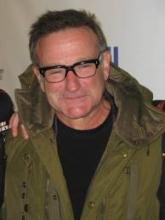The news last night was tragic: Robin Williams has died of an apparent suicide at the early age of 63. I saw the news and felt overwhelmingly sad. Really? He was a tremendous actor, a creative genius by any account, a man who I imagined had everything – talent, wealth, fame, the wonderful ability to make people laugh and to brighten lives. Such people also get draped with love and admiration, though certainly at a price. For what it’s worth, Robin Williams has been open about the fact that he’s struggled with both depression and addiction, but the complete story is never the one that gets told by the media.
Twitter started with 140-character links to suicide hotlines and suicide awareness, to statements about how depression is a treatable illness – Is it always? – and I hit retweet on a comment stating:" We’re never going to get anywhere till we take seriously that depression is an illness, not a weakness" and several people retweeted my retweet. I’m not sure why I did this; I don’t think that most people still think of mood disorders as a "weakness," or that those who do might change their minds because of a tweet. And I don’t think that suicide does anything to reduce stigma.
One psychiatrist friend tweeted a comment about how one should never ask someone why they are depressed, I guess because the "why?" implies something other than because biology dictated it, but if you’ve ever spoken to a person suffering from depression, you know that it comes in all shades of severity and that people often write a story to explain it. Sometimes that story is right: I’m depressed because of a breakup, or because I don’t have a job now, or because of ongoing work stress – and indeed, the person suffering often feels better after talking about the situation, after getting a new boyfriend or a new job, or after their boss moves to Zimbabwe.
I’m convinced that treatment works best when psychotherapy is combined with medication (if indicated), and while medicines are a miracle for some, they aren’t for others. As psychiatrists, we certainly see a good deal of treatment-resistant depression. And yes, the antipsychiatry faction may postulate that it is the treatment – the medications, specifically – that cause people to kill themselves and others, but I will leave you with the idea that the science just doesn’t support that. Certainly, they aren’t for everyone, but clinically, I have seen medications do more good than harm in clinical practice overall.
I know nothing about Robin Williams beyond what I’ve read in the media, and I know that the media reports are often incomplete and distorted. I do imagine that Mr. Williams had the resources to get good care and that he may well have had treatment for depression since he was open about his struggle. His story will be used to say: "Get help," and if you’re feeling suicidal and aren’t getting help, please do so. If you’re feeling suicidal and "help" isn’t making you feel better, please consider getting a second opinion or a different kind of help.
The tragic thing about suicide is that it’s a permanent answer to what is often a temporary problem.
Sometimes, I imagine that there are people who have tried and tried to get help and that their pain remains so unbearable for so long that suicide offers them the only possible relief – if such a thing is even to be had given that we don’t what comes next and some religions will say that suicide leads to nowhere good. Even if it provides relief to the person involved, it comes with the cost of leaving those who remain in horrible pain. Sadly, depressed people sometimes imagine that the world will be better off without them, and often that idea is just not true.
I hope that Robin Williams is in a better place, for his sake. I hope that before he ended his life, he tried every possible treatment option, and that this wasn’t an impulsive decision, or one based on an episodic relapse of either depression or substance abuse – a relapse that may have resolved and let him live for decades more. I hope his wife and children and all the people who knew and loved him will eventually find some peace. His death, however, is not simply a personal one because he touched us all with his talent and his charisma. What a tragic loss.


